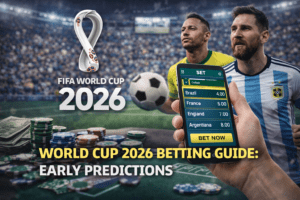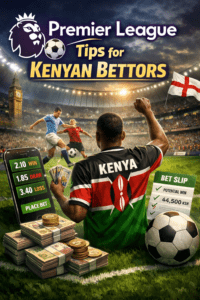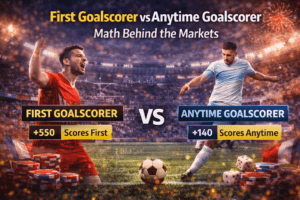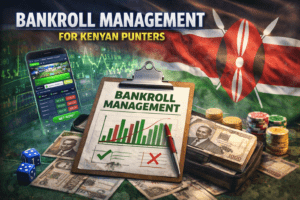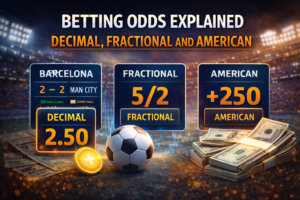
Introduction to Champions League betting and competition structure
The UEFA Champions League is the most prestigious club competition in world football, and it attracts massive betting volume every season. Bettors from every continent follow the matches closely, yet many do not fully understand how different the competition behaves in each phase. Champions League betting is not a one size fits all activity. The group stage and the knockout round each have unique tactical profiles, psychological pressures, risk levels and market dynamics. Anyone who treats both phases the same is likely to lose value over the long term.
The group stage is played over six matches per team, which creates patterns, momentum swings and scenarios influenced by the table. Teams experiment more, rotate players and face opponents with very different motivations. The knockout round, however, completely changes the character of the competition. Matches become tighter, more strategic and more cautious. The margin of error is smaller and pressure levels rise significantly.
For bettors, understanding these contrasts is essential. In this article we break down how the group stage and knockouts differ, how markets behave, how odds move and which strategies work best in each phase. With proper analysis you can avoid common mistakes and improve long term expected value in Champions League betting.
How the Champions League group stage behaves for bettors
Motivation patterns in early and late group games
Group stage motivation is one of the most important factors to understand. In the first two matchdays teams try to set the tone, experiment with ideas and often play more open football. These games can produce more goals, more corners and higher tempo because squads are fresher and risks are lower.
By matchdays five and six, motivation becomes inconsistent. Some teams have already qualified and rotate heavy, while others play with desperation to survive. This creates mispriced odds that can be exploited. Bettors who track group standings can find strong value in underdog teams fighting for qualification or in overs where one team must attack relentlessly.
Tactical trends and match tempo in group stage
Group stage football tends to be more expressive and less conservative. Teams take more risks because one bad match does not eliminate them. This leads to higher scoring games, open transitions and more cards in fixtures involving aggressive sides. Matches between clubs that know each other poorly also create unpredictability, since tactical preparation is limited and teams often react on the fly.
From a betting perspective this means the group stage offers stronger opportunities for overs, corners, team totals and prop bets related to attacking metrics. The tempo is more fluid and this benefits bettors who specialize in dynamic markets.
Statistical consistency and predictive value during groups
Because each team plays six matches, bettors have more data to work with. Patterns like average possession, expected goals, pressing intensity and shot volume stabilize within the group stage. This makes statistical models more reliable. Bettors who track underlying numbers can anticipate market weaknesses before odds adjust.
Group stage data is also valuable for identifying future knockout trends. Teams that dominate early often carry confidence into the next round, while teams that scrape through may become overly cautious.
How betting dynamics change in the knockout phase
Two leg strategy and aggregate score influence
The knockout phase is where Champions League betting becomes more complex. Most ties involve two legs, although finals use a single match format. In two leg matches the strategy often revolves around aggregate score management. The first leg tends to be more cautious, while the second leg explodes with intensity depending on the situation.
Teams leading the tie tend to slow the match, reduce risk and protect the advantage. Teams behind must attack more aggressively and this can produce overs, corners and card spikes. Understanding these tactical shifts is crucial for accurate betting.
Defensive discipline and reduced scoring volatility
One of the clearest differences between the group stage and the knockouts is defensive discipline. Teams prioritize stability and avoid conceding early goals. This usually leads to lower scoring games, especially in first legs. Unders, possession based props and cards markets tend to have more value during this phase.
Elite teams handle pressure with structure rather than chaos. They compress space, reduce transitions and avoid unnecessary risks. This fundamentally changes how bettors should approach markets.
Pressure, psychology and home advantage in knockouts
Psychology plays a massive role in the knockout rounds. The stakes are higher, crowds are more intense and mistakes become costly. Home advantage also increases because emotional support boosts confidence and affects referee decisions. Bettors should factor in stadium environment, travel fatigue and crowd influence.
In many knockout matches the first fifteen minutes are cagey due to fear of early mistakes. This can create value in first half unders, late action on cards or second half goals when pressure increases.
Market behaviour and odds movement from groups to knockouts
Bookmaker models and pricing accuracy
Bookmakers are far more accurate in the Champions League knockout rounds. Liquidity is higher, public attention increases and sharp bettors influence the odds early. This makes value harder to find. In the group stage, models are less precise because they rely on new data and unpredictable motivation levels. Value is easier to find before bookmakers adjust.
Liquidity, public bias and sharp movement
Public bias strongly influences knockout markets. Teams like Real Madrid, Barcelona, Manchester City and Bayern attract massive support regardless of form. This can inflate prices and create value on underdogs or alternative markets. Sharps often bet early in the knockout phase, moving odds quickly. Bettors must understand these shifts to avoid entering the market too late.
Differences in live betting opportunities
Live betting is more predictable in the knockout stage because tactical patterns are clearer. For example, when a team trails by two goals in the second leg, their pressure becomes extreme and late corners or cards rise sharply. Group stage live betting is more chaotic but offers more opportunities for dynamic overs and momentum based markets.
Comparison table: group stage vs knockout betting
| Aspect | Group Stage | Knockout Stage |
|---|---|---|
| Motivation | Highly variable | Highly focused |
| Tempo | Fast and open | Controlled and cautious |
| Goals | More frequent | Lower in first legs |
| Value Markets | Overs, props, corners | Unders, cards, possession props |
| Bookmaker Accuracy | Moderate | Very high |
| Live Betting | Chaotic but profitable | Predictable based on match state |
Profitable strategies for group stage betting
High scoring games, motivation mismatches and rotation factors
The group stage offers some of the best opportunities for high scoring matches. Big teams often dominate smaller sides with heavy rotation, creating mismatches that produce many goals, corners and shots. Bettors should target games where one team must win by a large margin or where rotations weaken defensive structure.
Using statistical analysis to target overs, corners and props
Expected goals, shot volume and wing play metrics help identify overs and corner value. Teams with high possession in the final third produce more attacking sequences. Bettors should also target player props like shots on target or assists in matches with heavy tactical imbalance.
Value in early markets and long term bets
Early lines in the group stage are often mispriced because bookmakers lack data. Bettors who act early can secure strong value. Futures markets like group winners or top scorers also offer better odds during this stage.
Profitable strategies for knockout betting
First leg vs second leg tactical patterns
First legs tend to be slower and more tactical. Bettors should target unders, corner unders and cautious markets. Second legs depend entirely on the aggregate score. When a team needs multiple goals, attack intensity increases and overs, corners or card markets become attractive.
Importance of away goals era vs modern format
Although the away goals rule has been removed, tactical habits remain. Teams still approach away fixtures cautiously. Bettors must track how coaches adjust to the modern format and analyze whether teams still follow previous tendencies.
Targeting unders, cards and possession based props
Knockout matches are ideal for cards betting. Pressure increases foul intensity and tactical fouling rises. Bettors should target card overs in physical matchups. Possession props are also effective because elite teams control games slowly to reduce risk.
Key competition trends and what bettors must avoid
Overreacting to group stage form
Teams that dominate the groups do not always carry momentum into the knockouts. Some face weaker early opponents and then struggle against elite sides. Bettors should avoid assuming group dominance equals knockout success.
Misreading knockout pressure and game tempo
Many bettors expect knockout matches to mirror league performance. This is a mistake. Knockout ties slow down, become tighter and produce fewer goals.
Ignoring travel, fatigue and squad depth
European travel, congested fixtures and injury lists affect knockout results. Squad depth becomes more important than form or individual talent.
Conclusion on how to adapt Champions League betting strategies
Champions League betting is most profitable when bettors understand the structural differences between the group stage and the knockouts. The group stage rewards aggressive, statistics based analysis, while the knockouts require strategic thinking, psychological insight and game state awareness. By adjusting your approach to each phase, you can find consistent value and avoid the common traps that reduce long term profitability.
FAQ
1. Are group stage matches easier to predict
They are easier for overs and corners because momentum and motivation are clearer.
2. Are knockout matches better for unders
Yes, first legs especially tend to be cautious and defensive.
3. Which markets offer the most value in knockouts
Cards, possession props and second half corners often provide strong value.
4. Does public bias affect Champions League betting
Yes, popular teams influence odds heavily, especially during knockouts.
5. Is live betting more profitable in groups or knockouts
Both offer value, but knockouts provide predictable reactions to scoreline pressure.
6. Does home advantage matter more in knockouts
Yes, pressure and crowd influence intensify in elimination matches.
7. Where can I find reliable Champions League statistics
One of the most authoritative resources is uefa.com, which provides match data and reports.

